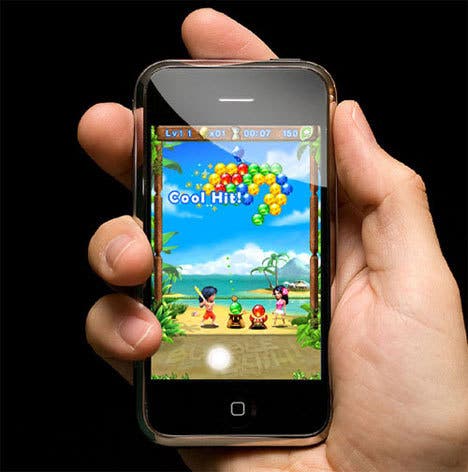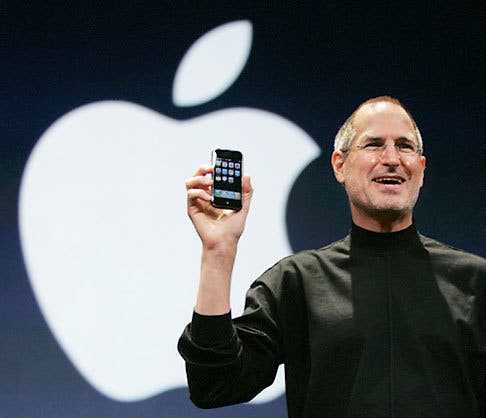iPhone Gaming
Apple's unexpected gaming platform.
Using the App Store, unlike almost every other mobile gaming experience, is straightforward and intuitive. It can be browsed either on your PC (applications you download are synced to the iPhone next time you plug it in) or on the phone itself. For the most part, you'll discover applications by searching for specific things, or by using the fairly comprehensive user review and rating system to allow great applications to "float" to the top of the lists.
One touch of a button and the application or game is downloaded and automatically installed, ready for use. Apple bills your credit card directly and emails you an invoice within 24 hours, and there are no data charges - so no nasty surprises on your phone bill at the end of the month.
The advantage for developers is obvious. Not all iPhone users are interested in playing games, of course - PCs have the same problem, in that it's impossible to get a sensible figure for the installed base, because so many of them are bought for offices and the likes. However, the simple fact remains that for the first time, game developers have a mobile platform which is as open to developers as the PC, and which has a built-in Steam-style digital distribution system with a healthy revenue sharing model (70 per cent goes to the developer).
Moreover, it's actually quite an appealing platform for games. There's no way we'd have said that a few years ago, we confess - but the DS and the Wii have forced us to recognise that not every game is going to need a D-Pad and face buttons to be playable. What the iPhone brings to the table in place of buttons is a motion sensor (not dissimilar to Sony's Sixaxis technology in practice) and a multi-touch screen, which can register and track multiple fingers moving on the screen at once. In addition, it's got a built-in camera, GPS, and internet access - and, of course, access to your music library, which some rhythm games are already using to good effect.

The limits of what can be done with this technology will take years to explore, but the potential is vast. From the existing library of genres, it's obvious that puzzle games, strategy games, board games, word games, rhythm games and their ilk will all translate to the platform rather nicely. Curiosities such as flOw would play very well on iPhone, too - and while promising early examples like Monkey Ball fall slightly short (see our review), they have enough merit to draw some praise and have performed well enough to encourage their parents to make a greater effort going forward.
More importantly, there's potential for games that break existing conventions completely. The things developers could do with GPS, a camera, an internet connection and the assumption that you're mobile and moving around are limited only by imagination - and thanks to the lack of conventional controls, we'll hopefully see plenty of that imagination, and not so much in the way of cheap, tacky ports.
Equally, the iPhone is no slouch when it comes to processing power. Estimates from developers suggest that it probably packs about as much punch as the PSP - which puts a bit of a dampener on Sony's rumoured ambition to launch a phone based on the PSP hardware in the future. Despite this, the unique nature of the platform means that there is an opportunity for small teams (even just a coder and an artist, as id Software's John Carmack recently suggested) to make big hits.
We're not going to engage in speculation about whether iPhone could be a "PSP-killer", let alone a "DS-killer". It's neither of those things, and it never will be. What it could be, though, is a "killer" for the ambitions of many firms in the mobile gaming business - and simultaneously, the saviour of mobile gaming itself. IPhone is everything that mobile gaming should have been for years. It's easy and accessible to develop for, and teams can take their creations directly to the public via the App Store without having to navigate the murky world of content aggregators and network operators. It's powerful, it's feature-packed and it's got a control system that could drive innovation and originality. Moreover, it's cool, it's popular, and it's heavily marketed.

Right now, of course, it's waiting for killer apps - but it may not be waiting for long. Freeware rhythm game Tap Tap Revenge has already seen a million downloads on iPhone, and there's talk of a commercial version full of licensed music. Other software by small teams is riding high in the charts - and some larger publishers saw multi-million dollar revenues from their games on iPhone in the first weekend on sale, with estimates placing Super Monkey Ball at the top of the revenue chart with over USD 4 million in sales.
The signs are clear. After years of turning up our noses, we could all be playing games on mobile phones sooner than anyone expected. We wouldn't advise anyone to take the plunge on an iPhone for gaming purposes right now - but if the device really lives up to its potential, this could be the most exciting (and unexpected) newcomer to the games market for years.
